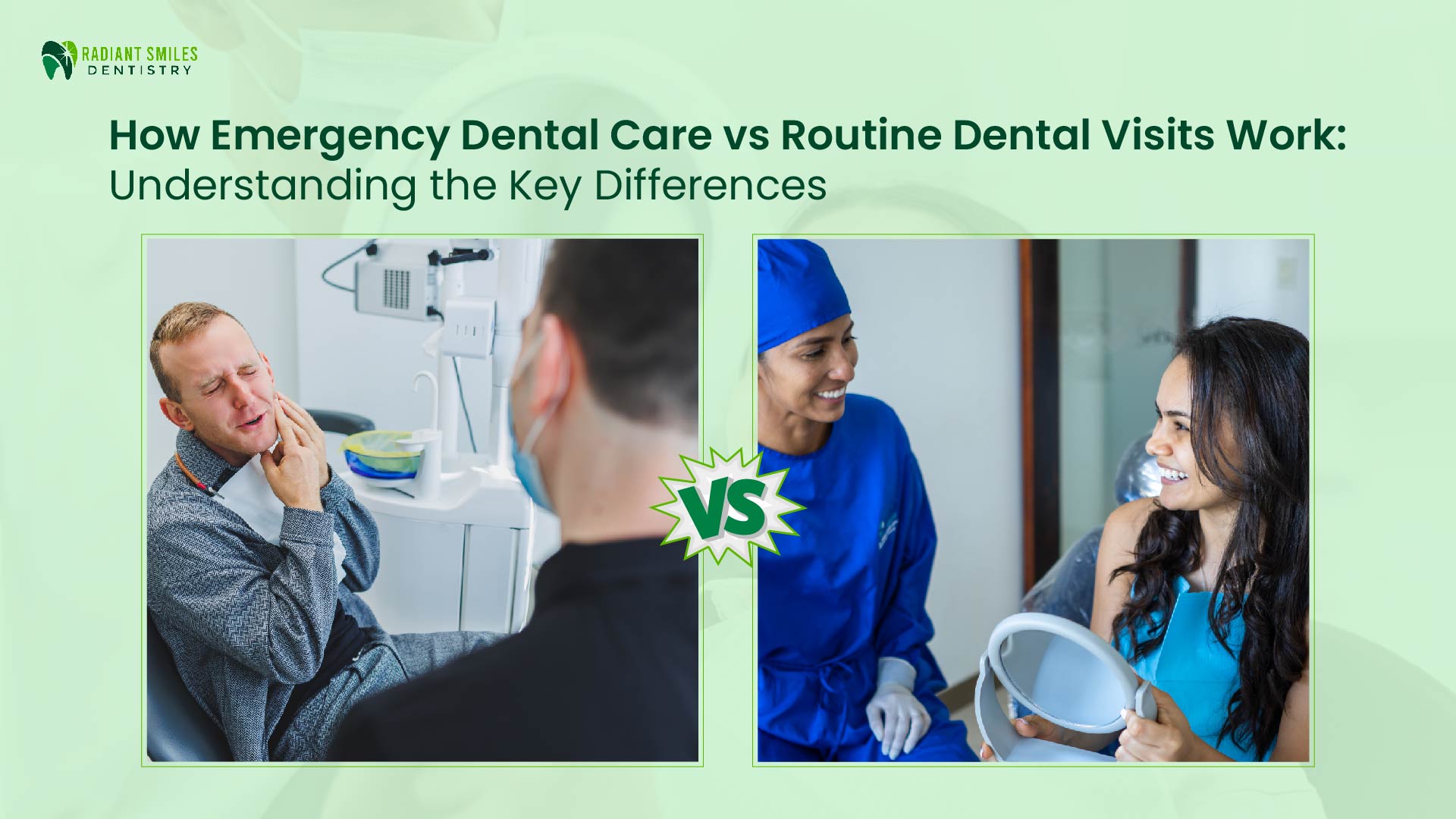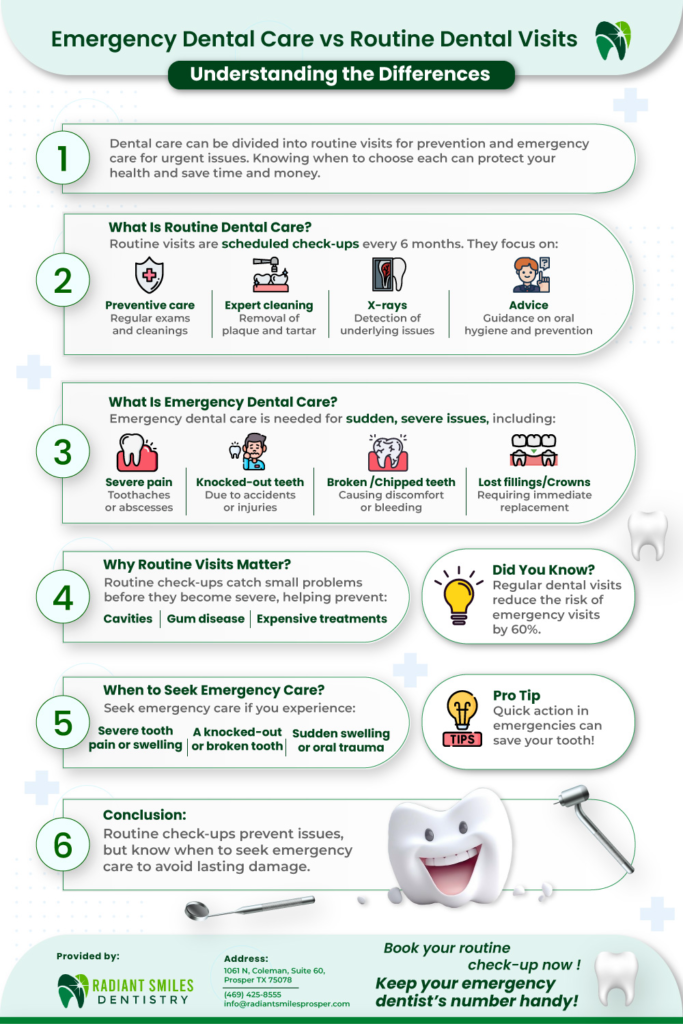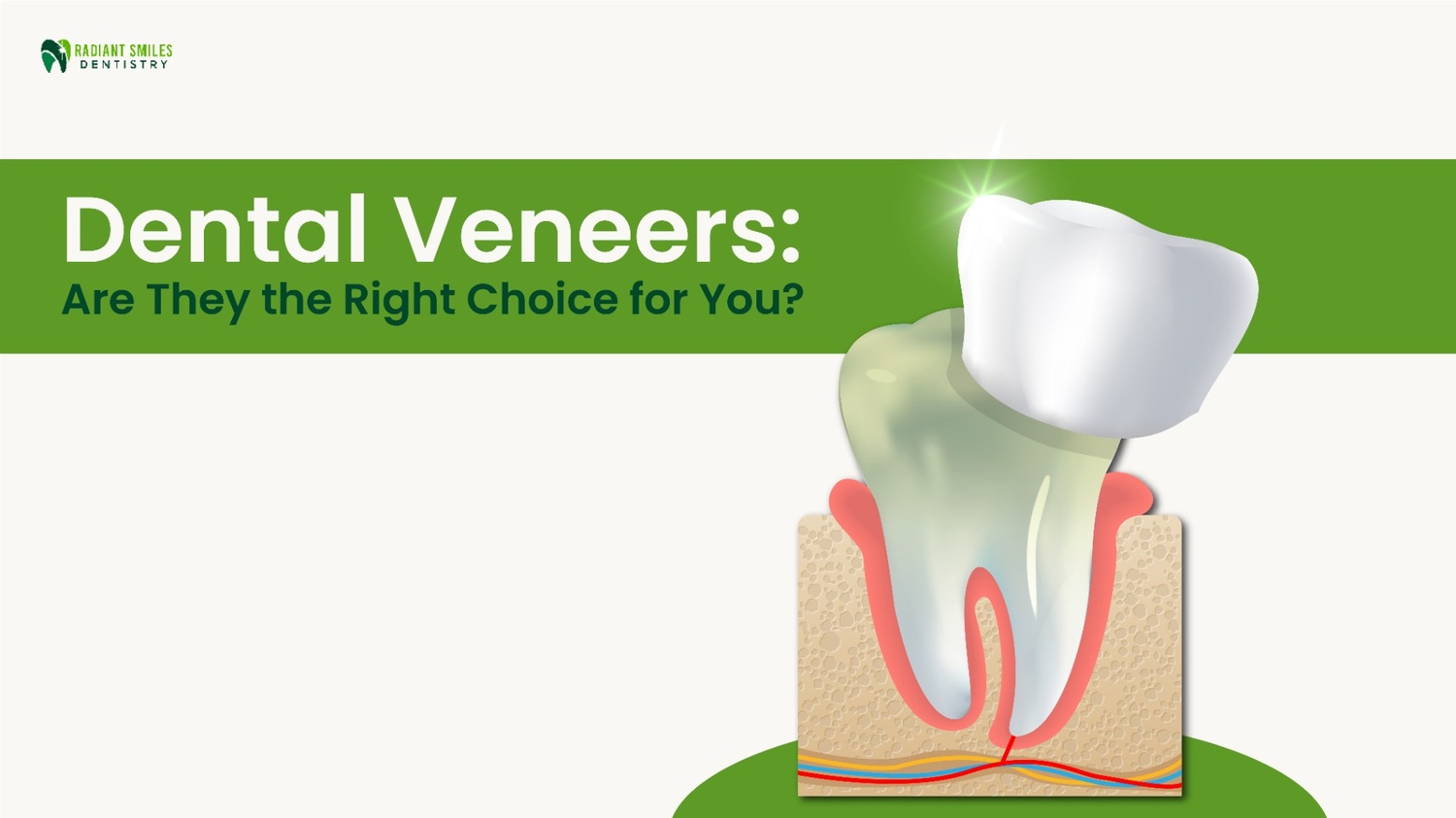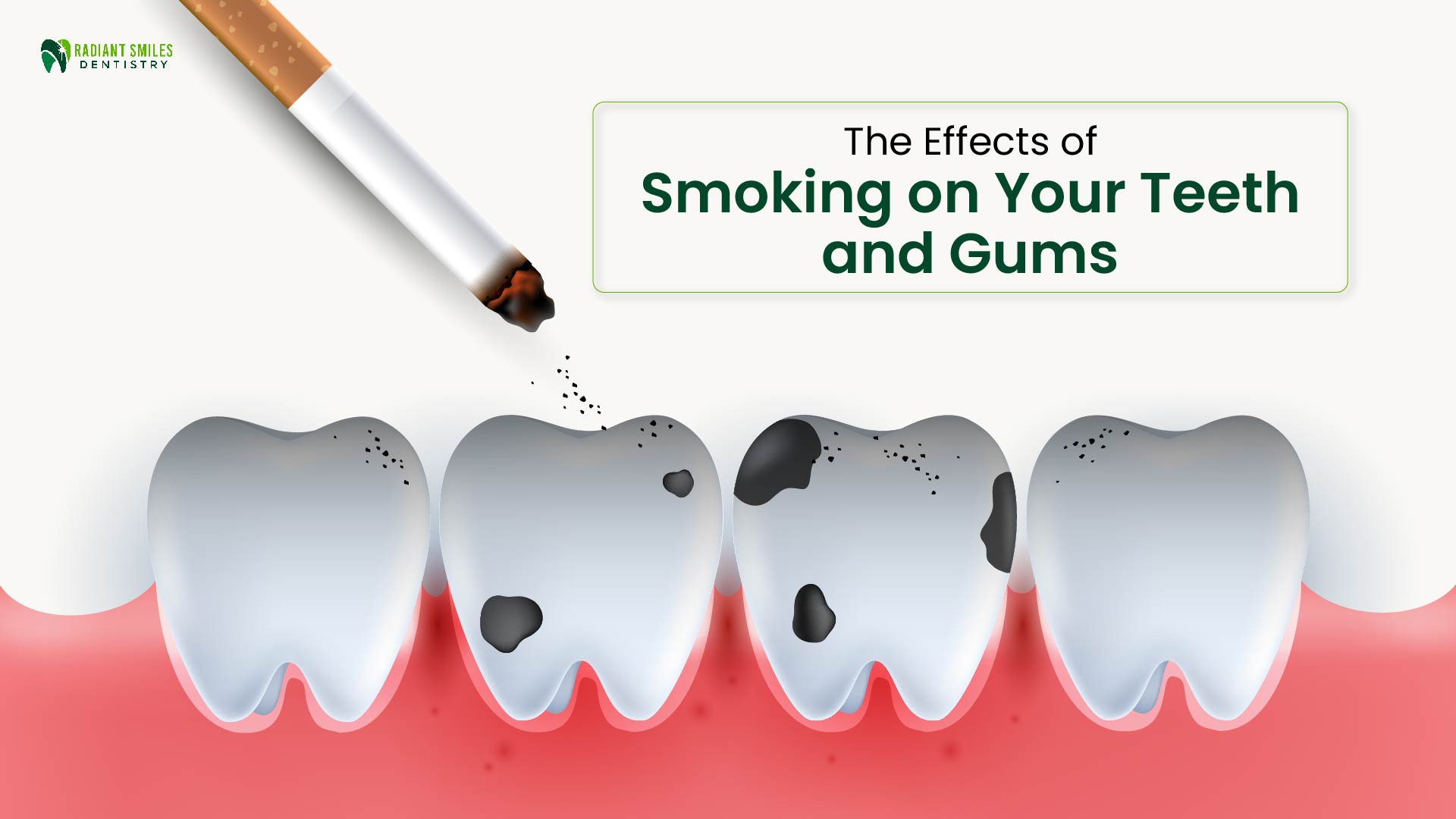Understand the key differences between routine and emergency dental care. Learn when...
How Emergency Dental Care vs Routine Dental Visits Work: Understanding the Key Differences

Introduction
Dental health plays a crucial role in overall well-being. Whether you’re scheduling a regular check-up or rushing in for the best emergency dental services in Prosper TX, you need to understand the difference between routine visits and emergencies and how they can help you make better decisions for your oral health. But how exactly do these two types of visits differ? And what should you know about each?
Let’s break down the differentiating aspects of routine dental visits and emergency dental care and elaborate on why the two are important in maintaining a healthy smile.
Regular Dental Visits: Basis to Strong Oral Health
Routine dental visits, or preventive visits, are scheduled appointments with your dental expert at regular intervals—usually every 6 months. These visits are planned to keep your teeth and gums in the best condition and prevent dental issues from getting severe.
A Routine Dental Visit: Details
1. In-depth Examination
The main aim of a routine dental visit is to check the current state of your dental health. Your dentist will do a thorough checkup of your mouth, gums, and teeth. This covers looking for cavities, gum disease, dental decay, and initial signs of oral cancer. They’ll also examine your bite and jaw alignment.2. Expert Cleaning
Even with regular brushing and flossing; plaque and tartar can develop in areas that are tough to reach. During a routine visit, your dental specialist or hygienist will clean your teeth efficiently, deep cleaning plaque and tartar, polishing the surface, and keeping your teeth free from harmful bacteria.3. X-Rays
Depending on your dental health and age, your dental specialist may ask for X-rays to find underlying issues, such as cavities between teeth or gum-related concerns. This is crucial for timely detection and treatment.4. Preventive Care and Guidance
Dental experts often provide guidance on improving your oral hygiene, such as suggesting specific toothbrushes, flossing processes, or dietary changes. For children and teenagers, they might advise sealants or fluoride treatments to prevent decay. “Prevention is better than cure”—routine visits help catch small issues before they turn into major problems that require expensive and invasive treatments, so visit the best general dentist in Prosper today and get your routine dental checkup done!Why Routine Visits Matter
Routine visits are needed to maintain optimal oral health. According to the American Dental Association (ADA), about 47% of adults aged 30 and above have some form of gum problem. Regular visits allow your dental specialist to detect pre-signs and other oral health issues that, if left uncured, may lead to a serious complication; such as loss of tooth or systemic health problems (such as heart disease and diabetes).
Did You Know?
People who visit dental experts regularly are 60% more likely to maintain healthy teeth and gums than those who avoid regular check-ups.
Emergency Dental Care: When Quick Care is the Need
While routine visits focus on prevention, emergency dental care deals with urgent problems that require immediate attention to alleviate pain, prevent further damage, and protect your overall health. These situations often arise suddenly and can be incredibly stressful.
How do you know if you need an emergency dentist?
Emergencies can occur at any time. Here are some common signs patients require emergency dental care:
1. Tooth Pain or Abscesses
A severe toothache, mainly if accompanied by swelling, could indicate an infection or abscess. An abscessed tooth can create severe pain and, if left untreated, can spread to different body parts.
2. Knocked-Out Tooth
Accidents or sports injuries can lead to knocked-out teeth. If this happens, it’s crucial to see a dentist immediately. In certain cases, a knocked-out tooth can be re-implanted if immediate treatment is done within an hour or so.
3. Fractured or Broken Teeth
A broken or chipped tooth, especially if it’s causing pain or bleeding, needs quick attention. In certain cases, the damage can be fixed using a dental crown, bonding, or other dental procedures.
4. Loose Fillings or Crowns
If a filling or crown comes loose; it’s needed to change it soon to avoid further damage or infection of the tooth.
5. Gum Lacerations or Oral Trauma
Injuries to the soft tissues of the mouth, such as cuts on the gums or lips, need emergency care to prevent infection and quick healing.
6. Sudden, Unexplained Swelling
Puffiness in the gums, face, or mouth could be a sign of an infection, requiring urgent dental intervention.
“Emergency dental care can often be the difference between saving and losing a tooth.” – Dr. Jane Smith, Emergency Dental Specialist.
How Does Emergency Dental Care Differ from Routine Visits?
Urgency
The most significant difference is the necessity of the situation. Routine visits are planned and scheduled in advance, while emergency care is mainly needed soon or within a short time frame. Pain, swelling, or an injury often demands urgent attention.
Cost
Emergency dental care can often be costlier than routine visits as per the immediate nature of the service and the specialized treatments required. According to a National Center for Health Statistics report, patients seeking emergency dental treatment mainly pay 20-40% more than for a standard check-up.
Treatment Scope
Routine visits focus on prevention and minor issues, while emergency visits focus on treating urgent conditions that can lead to permanent damage or intense pain if left untreated for a longer time.
Follow-Up Care
Emergency visits often require follow-up care. For example, a patient with a knocked-out tooth may need a follow-up to ensure the tooth is healing properly and that no further infection has developed.
How to Handle a Dental Emergency
If you ever see yourself in a dental emergency, here are a few tips on how to handle the situation before getting to the dental expert:
Tooth pain: Rinse your mouth with lukewarm salt water and use over-the-counter pain relief to decrease swelling.
Knocked-Out Tooth: Keep the tooth moist, either by placing it in milk or your mouth, and get to a dental specialist as soon as possible.
Chipped Tooth: Save broken pieces and apply a cold pack to decrease swelling. Your dentist will likely be able to bond the tooth back together.
Abscess or Infection: Rinse with warm salt water and take care immediately to avoid the infection from spreading.
Infographic: Emergency Dental Care vs. Routine Dental Visits

Conclusion: Regular and emergency dental care are both essential for oral health
While regular dental visits are critical for preventive care and maintaining long-term oral health, emergency dental care is essential to address urgent issues that could lead to severe pain, tooth loss, or infection. Both types of care are necessary to ensure a healthy mouth and avoid costly procedures later.
By identifying the differences between regular and emergency dental care, you’ll be better prepared to take care of your smile. Remember, regular dental check-ups can help you overcome most emergencies—but when the unexpected happens, don’t hesitate to seek the urgent care you need.
“A healthy smile is a happy smile. Keep it that way with routine care—and know when to seek emergency help.”
By opting for preventive visits and understanding how to tackle emergencies, you’re setting yourself up for a lifetime of great oral health. So, never skip the next routine check-up, and keep the number for your best emergency dental services in Prosper, TX handy—just in case!
Frequently Asked Questions
What is the most common dental emergency?
The most frequent dental emergency is tooth pain, which often happens due to an infection, abscess, or severe decay. It can result in pulsative pain and puffiness that requires urgent treatment to avoid complications.
Can a regular dentist pull a tooth?
Yes, a regular dentist can remove a tooth if needed. However, a dental surgeon will handle complex extractions, such as impacted wisdom teeth.
Will an emergency dentist do a filling?
Yes, an emergency dental expert can perform a filling if the issue is urgent, like a broken filling or a cavity developing significant pain. They will address the immediate need and may schedule follow-up care for a detailed treatment.
How do you respond to a dental emergency?
In a dental emergency, stay patient and observe the situation. For tooth pain, gargle with lukewarm water and use over-the-counter pain relief. For a knocked-out tooth, keep it moist and get to the dentist immediately. Always opt for professional care as soon as possible.
| Recent Blog Post
Dental Veneers: Are They the Right Choice for You?
Ever wondered what your smile would say if it could talk? For...
The Effects of Smoking on Your Teeth and Gums
Ever wondered what your smile would say if it could talk? For...









